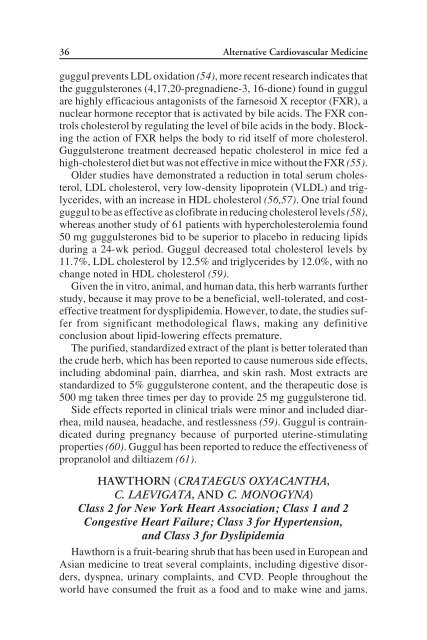Complementary Alternative Cardiovascular Medicine
Complementary Alternative Cardiovascular Medicine
Complementary Alternative Cardiovascular Medicine
Create successful ePaper yourself
Turn your PDF publications into a flip-book with our unique Google optimized e-Paper software.
36 <strong>Alternative</strong> <strong>Cardiovascular</strong> <strong>Medicine</strong><br />
guggul prevents LDL oxidation (54), more recent research indicates that<br />
the guggulsterones (4,17,20-pregnadiene-3, 16-dione) found in guggul<br />
are highly efficacious antagonists of the farnesoid X receptor (FXR), a<br />
nuclear hormone receptor that is activated by bile acids. The FXR controls<br />
cholesterol by regulating the level of bile acids in the body. Blocking<br />
the action of FXR helps the body to rid itself of more cholesterol.<br />
Guggulsterone treatment decreased hepatic cholesterol in mice fed a<br />
high-cholesterol diet but was not effective in mice without the FXR (55).<br />
Older studies have demonstrated a reduction in total serum cholesterol,<br />
LDL cholesterol, very low-density lipoprotein (VLDL) and triglycerides,<br />
with an increase in HDL cholesterol (56,57). One trial found<br />
guggul to be as effective as clofibrate in reducing cholesterol levels (58),<br />
whereas another study of 61 patients with hypercholesterolemia found<br />
50 mg guggulsterones bid to be superior to placebo in reducing lipids<br />
during a 24-wk period. Guggul decreased total cholesterol levels by<br />
11.7%, LDL cholesterol by 12.5% and triglycerides by 12.0%, with no<br />
change noted in HDL cholesterol (59).<br />
Given the in vitro, animal, and human data, this herb warrants further<br />
study, because it may prove to be a beneficial, well-tolerated, and costeffective<br />
treatment for dysplipidemia. However, to date, the studies suffer<br />
from significant methodological flaws, making any definitive<br />
conclusion about lipid-lowering effects premature.<br />
The purified, standardized extract of the plant is better tolerated than<br />
the crude herb, which has been reported to cause numerous side effects,<br />
including abdominal pain, diarrhea, and skin rash. Most extracts are<br />
standardized to 5% guggulsterone content, and the therapeutic dose is<br />
500 mg taken three times per day to provide 25 mg guggulsterone tid.<br />
Side effects reported in clinical trials were minor and included diarrhea,<br />
mild nausea, headache, and restlessness (59). Guggul is contraindicated<br />
during pregnancy because of purported uterine-stimulating<br />
properties (60). Guggul has been reported to reduce the effectiveness of<br />
propranolol and diltiazem (61).<br />
HAWTHORN (CRATAEGUS OXYACANTHA,<br />
C. LAEVIGATA, AND C. MONOGYNA)<br />
Class 2 for New York Heart Association; Class 1 and 2<br />
Congestive Heart Failure; Class 3 for Hypertension,<br />
and Class 3 for Dyslipidemia<br />
Hawthorn is a fruit-bearing shrub that has been used in European and<br />
Asian medicine to treat several complaints, including digestive disorders,<br />
dyspnea, urinary complaints, and CVD. People throughout the<br />
world have consumed the fruit as a food and to make wine and jams.


